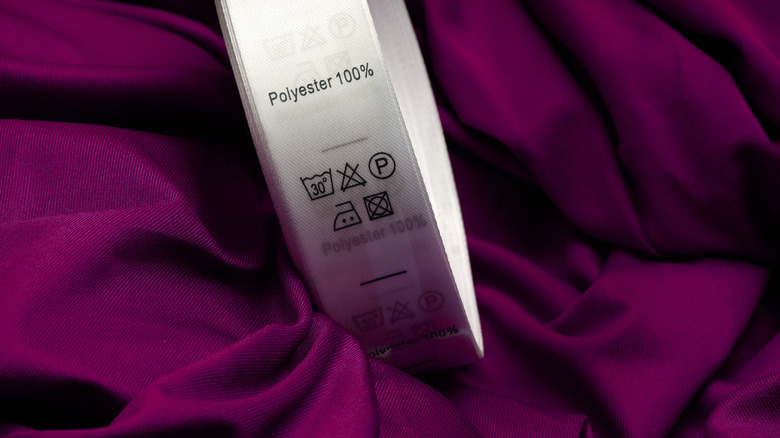How Wearing Polyester Affects Your Skin
Most of us can tell when a fabric choice doesn't agree with our skin. Oftentimes, our skin starts to itch and the urge to tear off the article of clothing becomes overwhelming. According to a 2015 study, researchers from Stockholm University concluded that there are thousands of harmful chemicals used in clothes manufacturing (via Science Daily). Giovanna Luongo, Ph.D. in Analytical Chemistry at Stockholm University, further explains the study's findings and what this means for consumers as well as for the environment. "Exposure to these chemicals increases the risk of allergic dermatitis, but more severe health effects for humans as well as the environment could possibly be related to these chemicals. Some of them are suspected or proved carcinogens and some have aquatic toxicity," he says.
Unfortunately, itchy skin is just one of many possible irritating outcomes that can arise from wearing certain kinds of fabrics. Of all the fabrics dominating today's modern clothing manufacturing industry, according to Bright Side, polyester is one of the most popular and most widely used synthetic fabrics, and surprisingly, can cause more than just an irritating itch.
Your clothing choices can affect your health
As described by the organic and eco-friendly clothing manufacturing company, SiiZU, "polyester is a plastic-like material made from coal, oil, and water." It's a synthetic material, and while it can be blended with natural ingredients such as cotton, it is ultimately made in a lab. As it turns out, polyester is actually pretty hard to avoid. Even if you have made a conscious choice to ban the material from your closet, it's still used in the making of many everyday items such as seatbelts, home furnishings, and tents.
Bright Side lists possible side effects from wearing polyester to include: rashes, itching, redness, eczema, and dermatitis. According to Who What Wear, one of the biggest issues with polyester is that it doesn't allow our skin to breathe. You've likely noticed this if you've ever worn polyester pants in the middle of a sweltering summer. The lack of oxygen to the skin causes a heightened body temperature, sweat, and odor, all of which increases the likelihood of exposure to harmful, infection-causing bacteria.
We're not trying to scare you away from your favorite dress or sweater, but if you've noticed your skin reacting negatively to the fabric, you may want to check the tag to see what it's made out of. After all, no matter how much you love the look of an article of clothing, it's likely not worth a rash or possible infection.


